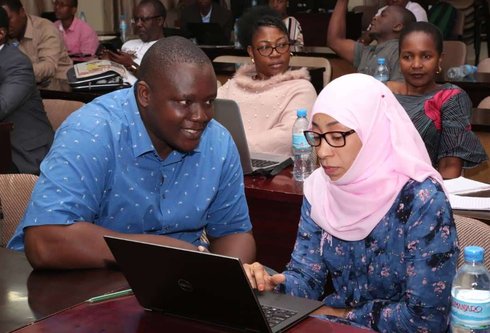Impact of the data use partnership
The data use partnership (DUP) has conducted rigorous evaluations of DUP interventions to understand the impact on health data use and improvements in health service delivery. The finding of two DUP impact studies are detailed below.
Assessing the impact of district health profiles on data use
District health profiles (DHPs) were introduced to strengthen data analysis and use in district councils in Tanzania. In 2017, the initiative was rolled out nationwide to cover all 184 councils. The DUP capacity building consortium supported 131 out of 184 councils in Tanzania in developing DHPs through offering capacity-building and technical support to local staff.
The district health profiles study
In 2021, the Tanzania Ministry of Health (MoH), with support from PATH Tanzania, conducted a survey of health management information system focal people throughout Tanzania, and key informant interviews in target regions. The assessment intended to document the data use practices supported by the DHPs, in addition to determining whether DHPs have facilitated data use at the council level, and how they are being used to make decisions related to the annual comprehensive council health plans.
Findings
Using DHPs in decision-making meetings
- Survey results showed that there was demand for DHPs among district council officials: 69.5% reported that they used DHPs in their decision-making meetings
Using DHPs to inform health activities
- 100% of interview respondents acknowledged that DHPs were important for the district council and most council health management team members (92.9%) have used DHP reports in their health planning activities.
- 87.5% of survey respondents reported that DHPs facilitated evidence-based health services planning in the council.
- 93.3% of the health management information system focal persons have used DHPs in their activities.
- The assessment findings revealed that health care provision, maternal and child health, and disease burden were the types of DHP information most used by stakeholders for planning and decision-making.
“The assessment showed that the availability of DHP reports provided a quick snapshot of a council’s health status, enabled quick access to health data, and triggered data use practices.”
Afya supportive supervision system impact assessment
The afya supportive supervision system (AfyaSS) is a digital platform that was developed through collaboration between the MoH, president office – regional administration and local government, PATH and other stakeholders. The AfyaSS system improves the management and use of health facility supervision data for better health service delivery in Tanzania. It also supports continuity in tracking performance, and ensures that better quality data is available and used in managing supervisions.
The supportive supervision system study
An impact evaluation was conducted with the goal of analyzing the improvements of health facility supportive supervision practices after the adoption of AfyaSS, and the use of the information in the system. A baseline assessment was conducted June- August 2021 and endline data collection was conducted in August 2022.
Findings
- The assessment indicated improved data use through real time access of previous supervision reports and plans.
- Better coordination was noted when organizing supportive supervision using the AfyaSS system. The findings showed that supervisors using AfyaSS will sit down together, arrange their areas of supervision, and access and discuss previous reports, gaps, and action items before visiting the health facilities.
- The AfyaSS system has promoted accountability as it requires the supervisors' and supervisees' signatures upon completion of a supervision visit and captures start and end time of the visit.
- 6 councils that received training from the DUP implementation team documented more planned supervision trips (N=589) compared to those which did not receive training (N=86)
“Since AfyaSS is a web-based system, it can allow supervisors to access and use the checklists at any time and any place, compared to paper-based checklists in which checklists were only available in paper files at the specific office.”— Regional health management team supervisor


